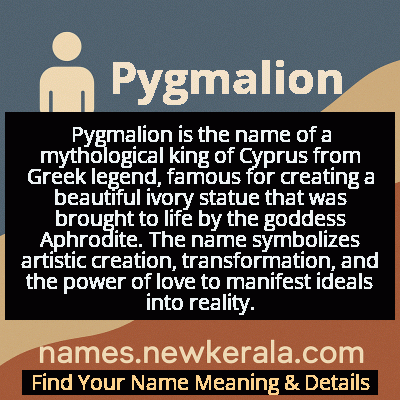Pygmalion Name Meaning & Details
Origin, Popularity, Numerology Analysis & Name Meaning of Pygmalion
Discover the origin, meaning, and cultural significance of the name PYGMALION. Delve into its historical roots and explore the lasting impact it has had on communities and traditions.
Name
Pygmalion
Gender
Male
Origin
Greek
Lucky Number
4
Meaning of the Name - Pygmalion
Pygmalion is the name of a mythological king of Cyprus from Greek legend, famous for creating a beautiful ivory statue that was brought to life by the goddess Aphrodite. The name symbolizes artistic creation, transformation, and the power of love to manifest ideals into reality.
Pygmalion - Complete Numerology Analysis
Your Numerology Number
Based on Pythagorean Numerology System
Ruling Planet
Uranus (Rahu)
Positive Nature
Strong sense of order, loyal, practical, and disciplined.
Negative Traits
Stubborn, overly serious, rigid, and prone to feeling restricted.
Lucky Colours
Blue, gray.
Lucky Days
Saturday.
Lucky Stones
Blue sapphire.
Harmony Numbers
1, 7, 8.
Best Suited Professions
Managers, engineers, accountants, organizers.
What People Like About You
Dependability, discipline, practicality.
Famous People Named Pygmalion
Pygmalion of Tyre
Ancient King
Founded Carthage through his daughter Dido/Elissa
Pygmalion (Mythological)
Mythological King
Central figure in transformation myth whose statue came to life
George Bernard Shaw's Pygmalion
Literary Character
Inspired the concept of transformative education and social engineering
Name Variations & International Equivalents
Click on blue names to explore their detailed meanings. Gray names with will be available soon.
Cultural & Historical Significance
The Pygmalion story has transcended its mythological origins to become a foundational cultural metaphor. In psychology, the 'Pygmalion effect' describes how higher expectations lead to improved performance, while in education and sociology, it illustrates how labeling and expectations can shape reality. George Bernard Shaw's 1912 play 'Pygmalion' and its musical adaptation 'My Fair Lady' reimagined the myth for modern audiences, exploring class dynamics, social engineering, and personal transformation. The name continues to symbolize the power of belief, mentorship, and the transformative potential of love and education.
Extended Personality Analysis
Individuals named Pygmalion are typically associated with creative, perfectionistic, and transformative personality traits. They often exhibit strong artistic sensibilities, attention to detail, and a drive to shape their environment according to their vision. Like the mythological king, they may possess idealistic tendencies, striving for perfection in their endeavors and relationships. These individuals are often visionary, seeing potential where others see limitations, and they frequently take on mentoring or teaching roles, believing in others' capacity for growth and transformation.
Pygmalion personalities tend to be determined and persistent, willing to invest significant time and energy into their projects or relationships. They may display a certain level of fastidiousness or high standards that can border on demanding, but this stems from their deep commitment to excellence. Their transformative nature means they often serve as catalysts for change in others' lives, though they may struggle with accepting imperfections in reality versus their idealized visions. The name suggests someone who bridges the gap between imagination and reality, possessing both creative vision and the practical ability to manifest that vision in the world.
Modern Usage & Popularity
In contemporary usage, Pygmalion remains an extremely rare given name, primarily used in academic, artistic, or literary contexts rather than as a common personal name. Its usage is almost exclusively symbolic or referential, often chosen by parents with strong classical education backgrounds or those working in creative fields. The name appears more frequently in business and brand names, particularly for art galleries, theater companies, and educational institutions that wish to evoke themes of transformation and excellence. While it has never appeared on popular baby name charts, it maintains a niche presence among those seeking distinctive mythological names with deep cultural resonance. The name's association with the 'Pygmalion effect' in psychology and education ensures its continued relevance in professional discourse.
Symbolic & Spiritual Meanings
Pygmalion symbolizes the transformative power of love, art, and belief. The name represents the archetype of creation and manifestation - the ability to breathe life into one's visions and ideals. It embodies the concept that through dedication, skill, and emotional investment, one can transform raw material (whether stone, ivory, or human potential) into something living and beautiful. The symbolism extends to mentorship and education, representing how belief in someone's potential can catalyze their growth and self-actualization. Pygmalion also symbolizes the tension between idealization and reality, the artist's relationship with their creation, and the magical moment when imagination becomes reality through divine intervention or human effort.

